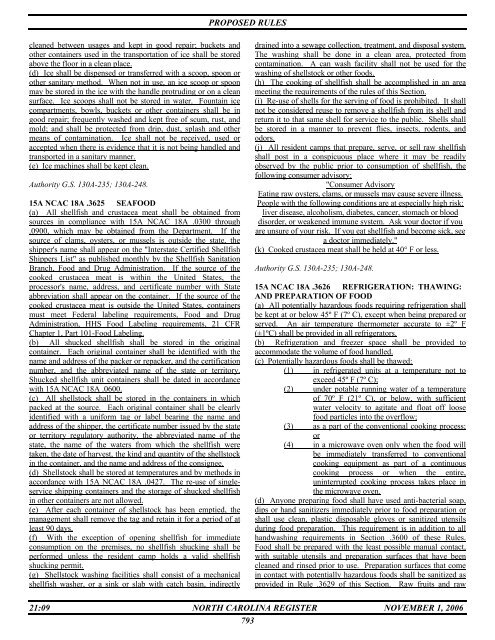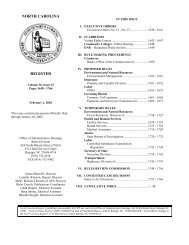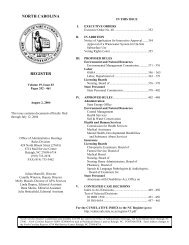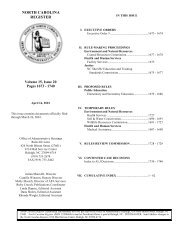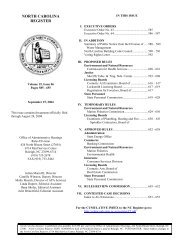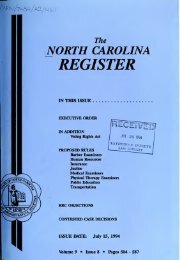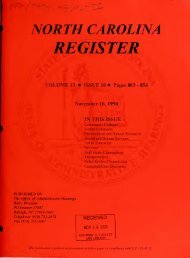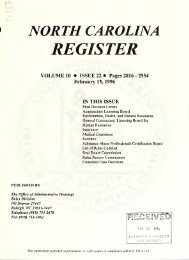NC Register Volume 21 Issue 09 - Office of Administrative Hearings
NC Register Volume 21 Issue 09 - Office of Administrative Hearings
NC Register Volume 21 Issue 09 - Office of Administrative Hearings
You also want an ePaper? Increase the reach of your titles
YUMPU automatically turns print PDFs into web optimized ePapers that Google loves.
PROPOSED RULES<br />
cleaned between usages and kept in good repair; buckets and<br />
other containers used in the transportation <strong>of</strong> ice shall be stored<br />
above the floor in a clean place.<br />
(d) Ice shall be dispensed or transferred with a scoop, spoon or<br />
other sanitary method. When not in use, an ice scoop or spoon<br />
may be stored in the ice with the handle protruding or on a clean<br />
surface. Ice scoops shall not be stored in water. Fountain ice<br />
compartments, bowls, buckets or other containers shall be in<br />
good repair; frequently washed and kept free <strong>of</strong> scum, rust, and<br />
mold; and shall be protected from drip, dust, splash and other<br />
means <strong>of</strong> contamination. Ice shall not be received, used or<br />
accepted when there is evidence that it is not being handled and<br />
transported in a sanitary manner.<br />
(e) Ice machines shall be kept clean.<br />
Authority G.S. 130A-235; 130A-248.<br />
15A <strong>NC</strong>AC 18A .3625 SEAFOOD<br />
(a) All shellfish and crustacea meat shall be obtained from<br />
sources in compliance with 15A <strong>NC</strong>AC 18A .0300 through<br />
.<strong>09</strong>00, which may be obtained from the Department. If the<br />
source <strong>of</strong> clams, oysters, or mussels is outside the state, the<br />
shipper's name shall appear on the "Interstate Certified Shellfish<br />
Shippers List" as published monthly by the Shellfish Sanitation<br />
Branch, Food and Drug Administration. If the source <strong>of</strong> the<br />
cooked crustacea meat is within the United States, the<br />
processor's name, address, and certificate number with State<br />
abbreviation shall appear on the container. If the source <strong>of</strong> the<br />
cooked crustacea meat is outside the United States, containers<br />
must meet Federal labeling requirements, Food and Drug<br />
Administration, HHS Food Labeling requirements, <strong>21</strong> CFR<br />
Chapter 1, Part 101-Food Labeling.<br />
(b) All shucked shellfish shall be stored in the original<br />
container. Each original container shall be identified with the<br />
name and address <strong>of</strong> the packer or repacker, and the certification<br />
number, and the abbreviated name <strong>of</strong> the state or territory.<br />
Shucked shellfish unit containers shall be dated in accordance<br />
with 15A <strong>NC</strong>AC 18A .0600.<br />
(c) All shellstock shall be stored in the containers in which<br />
packed at the source. Each original container shall be clearly<br />
identified with a uniform tag or label bearing the name and<br />
address <strong>of</strong> the shipper, the certificate number issued by the state<br />
or territory regulatory authority, the abbreviated name <strong>of</strong> the<br />
state, the name <strong>of</strong> the waters from which the shellfish were<br />
taken, the date <strong>of</strong> harvest, the kind and quantity <strong>of</strong> the shellstock<br />
in the container, and the name and address <strong>of</strong> the consignee.<br />
(d) Shellstock shall be stored at temperatures and by methods in<br />
accordance with 15A <strong>NC</strong>AC 18A .0427. The re-use <strong>of</strong> singleservice<br />
shipping containers and the storage <strong>of</strong> shucked shellfish<br />
in other containers are not allowed.<br />
(e) After each container <strong>of</strong> shellstock has been emptied, the<br />
management shall remove the tag and retain it for a period <strong>of</strong> at<br />
least 90 days.<br />
(f) With the exception <strong>of</strong> opening shellfish for immediate<br />
consumption on the premises, no shellfish shucking shall be<br />
performed unless the resident camp holds a valid shellfish<br />
shucking permit.<br />
(g) Shellstock washing facilities shall consist <strong>of</strong> a mechanical<br />
shellfish washer, or a sink or slab with catch basin, indirectly<br />
drained into a sewage collection, treatment, and disposal system.<br />
The washing shall be done in a clean area, protected from<br />
contamination. A can wash facility shall not be used for the<br />
washing <strong>of</strong> shellstock or other foods.<br />
(h) The cooking <strong>of</strong> shellfish shall be accomplished in an area<br />
meeting the requirements <strong>of</strong> the rules <strong>of</strong> this Section.<br />
(i) Re-use <strong>of</strong> shells for the serving <strong>of</strong> food is prohibited. It shall<br />
not be considered reuse to remove a shellfish from its shell and<br />
return it to that same shell for service to the public. Shells shall<br />
be stored in a manner to prevent flies, insects, rodents, and<br />
odors.<br />
(j) All resident camps that prepare, serve, or sell raw shellfish<br />
shall post in a conspicuous place where it may be readily<br />
observed by the public prior to consumption <strong>of</strong> shellfish, the<br />
following consumer advisory:<br />
"Consumer Advisory<br />
Eating raw oysters, clams, or mussels may cause severe illness.<br />
People with the following conditions are at especially high risk:<br />
liver disease, alcoholism, diabetes, cancer, stomach or blood<br />
disorder, or weakened immune system. Ask your doctor if you<br />
are unsure <strong>of</strong> your risk. If you eat shellfish and become sick, see<br />
a doctor immediately."<br />
(k) Cooked crustacea meat shall be held at 40° F or less.<br />
Authority G.S. 130A-235; 130A-248.<br />
15A <strong>NC</strong>AC 18A .3626 REFRIGERATION: THAWING:<br />
AND PREPARATION OF FOOD<br />
(a) All potentially hazardous foods requiring refrigeration shall<br />
be kept at or below 45º F (7º C), except when being prepared or<br />
served. An air temperature thermometer accurate to ±2º F<br />
(±1ºC) shall be provided in all refrigerators.<br />
(b) Refrigeration and freezer space shall be provided to<br />
accommodate the volume <strong>of</strong> food handled.<br />
(c) Potentially hazardous foods shall be thawed:<br />
(1) in refrigerated units at a temperature not to<br />
exceed 45º F (7º C);<br />
(2) under potable running water <strong>of</strong> a temperature<br />
<strong>of</strong> 70º F (<strong>21</strong>º C), or below, with sufficient<br />
water velocity to agitate and float <strong>of</strong>f loose<br />
food particles into the overflow;<br />
(3) as a part <strong>of</strong> the conventional cooking process;<br />
or<br />
(4) in a microwave oven only when the food will<br />
be immediately transferred to conventional<br />
cooking equipment as part <strong>of</strong> a continuous<br />
cooking process or when the entire,<br />
uninterrupted cooking process takes place in<br />
the microwave oven.<br />
(d) Anyone preparing food shall have used anti-bacterial soap,<br />
dips or hand sanitizers immediately prior to food preparation or<br />
shall use clean, plastic disposable gloves or sanitized utensils<br />
during food preparation. This requirement is in addition to all<br />
handwashing requirements in Section .3600 <strong>of</strong> these Rules.<br />
Food shall be prepared with the least possible manual contact,<br />
with suitable utensils and preparation surfaces that have been<br />
cleaned and rinsed prior to use. Preparation surfaces that come<br />
in contact with potentially hazardous foods shall be sanitized as<br />
provided in Rule .3629 <strong>of</strong> this Section. Raw fruits and raw<br />
<strong>21</strong>:<strong>09</strong> NORTH CAROLINA REGISTER NOVEMBER 1, 2006<br />
793


